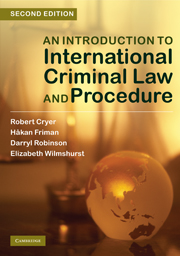Book contents
- Frontmatter
- Contents
- Preface to the Second Edition
- Table of Cases
- Table of Treaties and other International Instruments
- Table of Abbreviations
- PART A INTRODUCTION
- PART B PROSECUTIONS IN NATIONAL COURTS
- PART C INTERNATIONAL PROSECUTIONS
- PART D SUBSTANTIVE LAW OF INTERNATIONAL CRIMES
- PART E PRINCIPLES AND PROCEDURES OF INTERNATIONAL PROSECUTIONS
- 15 General Principles of Liability
- 16 Defences/Grounds for Excluding Criminal Responsibility
- 17 Procedures of International Criminal Investigations and Prosecutions
- 18 Victims in the International Criminal Process
- 19 Sentencing and Penalties
- PART F RELATIONSHIP BETWEEN NATIONAL AND INTERNATIONAL SYSTEMS
- Index
- References
18 - Victims in the International Criminal Process
from PART E - PRINCIPLES AND PROCEDURES OF INTERNATIONAL PROSECUTIONS
Published online by Cambridge University Press: 05 June 2012
- Frontmatter
- Contents
- Preface to the Second Edition
- Table of Cases
- Table of Treaties and other International Instruments
- Table of Abbreviations
- PART A INTRODUCTION
- PART B PROSECUTIONS IN NATIONAL COURTS
- PART C INTERNATIONAL PROSECUTIONS
- PART D SUBSTANTIVE LAW OF INTERNATIONAL CRIMES
- PART E PRINCIPLES AND PROCEDURES OF INTERNATIONAL PROSECUTIONS
- 15 General Principles of Liability
- 16 Defences/Grounds for Excluding Criminal Responsibility
- 17 Procedures of International Criminal Investigations and Prosecutions
- 18 Victims in the International Criminal Process
- 19 Sentencing and Penalties
- PART F RELATIONSHIP BETWEEN NATIONAL AND INTERNATIONAL SYSTEMS
- Index
- References
Summary
Introduction
Traditionally, the accused is at the very centre of the criminal process and he or she is afforded rights and protection in order to ensure a fair process. The opposite party is the prosecutor, in modern criminal systems primarily a public prosecutor representing the public interest in prosecuting crimes. But where does that leave the victim who, to be sure, also has interests in the process? Domestic systems address this issue in different ways. Generally speaking, an adversarial process, based upon two opposing parties before a neutral court, leaves little room for providing the victim with a strong and independent participatory role. Also, where private prosecutions are allowed if the public prosecutor is not pursuing the case, or where victims may play a subsidiary prosecutorial role when a public prosecution is instituted, the two-party process is basically retained. On the other hand, the more active role of the judge in an inquisitorial process, and consequently a less clear-cut two-party design, leaves a greater scope for victims to participate in their own right. Regardless of the system, however, victims play an important role as witnesses in the criminal process, a role that may be compromised if the victim also has an independent function in the same process.
Domestic systems also vary with respect to the victim's right to obtain compensation from the perpetrator of the crime.
- Type
- Chapter
- Information
- An Introduction to International Criminal Law and Procedure , pp. 478 - 493Publisher: Cambridge University PressPrint publication year: 2010



